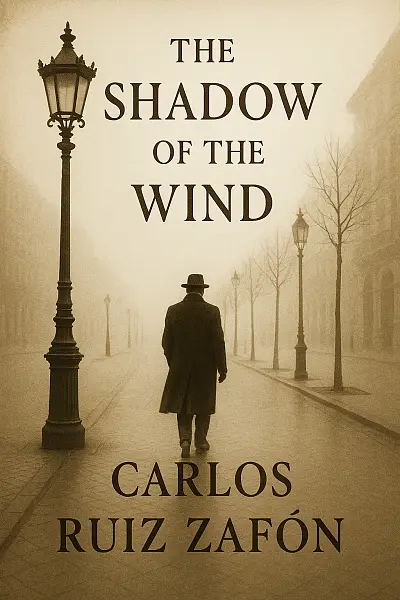
Intermezzo
by: Sally Rooney
Peter, a sharply intelligent Dublin lawyer, and his younger brother Ivan, a socially awkward chess prodigy, try to navigate daily life after losing their father. Each man seeks comfort: Peter juggles an old flame and a fresh, chaotic romance, while Ivan dives into a surprising connection with Margaret, an enigmatic older woman.
The brothers’ carefully constructed lives begin to unravel as grief pushes them into new emotional territory, making every relationship feel fragile. With everything hanging in the balance, each must decide if they’ll let themselves be seen—or if old wounds will keep them stuck.
Rooney’s tone is raw, intimate, and disarmingly honest, inviting readers inside the messiness of love and loss.
""We are always reaching for each other through the silence, hoping our honesty will be enough to close the distance.""
Let's Break This Down
The Author's Voice
Atmosphere
- Expect a mood that’s deeply introspective and quietly intense, where even the most mundane moments feel charged with emotional undercurrents
- The world Rooney builds is starkly modern—rooms feel both familiar and a little claustrophobic, soaked in routine and the low hum of existential worry
- Conversations take place in cramped flats, silent kitchens, or over late-night texts; everything feels intimate yet slightly off-kilter, like there’s always something unsaid lingering between people
Prose Style
- Rooney’s writing is clean and economical—forget flowery descriptions, she uses sharp, restrained sentences that do a lot of heavy lifting
- Dialogue dominates the page, often without quotation marks, creating a raw, almost journal-like immediacy that blurs lines between inner thought and spoken word
- Emotions are delivered with cool precision, stripped of melodrama but never cold—her prose captures the ache of longing, confusion, and vulnerability with remarkable clarity
- Don’t expect grand poetic flourishes; instead, the power lies in subtle repetition, razor-sharp observations, and the quiet accumulation of meaning
Pacing
- The rhythm here is measured and unhurried, with scenes unfolding in small, meaningful increments rather than big dramatic set pieces
- There are frequent, artful pauses—time lingers in awkward silences, unsent messages, and fleeting glances, which lets tension spool out delicately
- The story leans into everyday rhythms, sometimes looping through moments of stillness so that the rare bursts of emotion hit even harder
- Rooney is a master at making nothing feel like everything; if you want a fast-paced plot, this one asks you to slow down and savor the emotional granular
Characterization
- Prepare for characters who feel astonishingly real—flawed, awkward, sometimes frustrating, but always rich in interiority
- Much of the drama is internal: expect introspective monologues, fraught relationships, and the sting of self-doubt
- Rooney’s hallmark is capturing the minute shifts in relationships, the push and pull of connection and distance
- These aren’t heroes or villains—just people trying to make sense of themselves and those closest to them, and that bittersweet authenticity is the book’s beating heart
Overall Mood & Feel
- The emotional weight is subtle but cumulative; melancholy, restraint, and flashes of hope define the experience
- Readers who crave honest, beautifully observed human messy-ness—without easy answers—will find themselves totally absorbed
- Imagine eavesdropping on the most private, unscripted moments of people’s lives and leaving with your own feelings seen and unsettled
Key Moments
- Tense, almost wordless coffee shop reunion—resentment and longing simmering beneath every glance
- Emails that feel more intimate than love letters, full of awkward apologies and unsent confessions
- Sibling rivalry takes center stage: brutal honesty, jealousy, and small, unforgettable acts of kindness
- Rooney’s signature razor-thin line between cruelty and tenderness, especially in late-night kitchen arguments
- Stunning midpoint revelation—what’s not said hurts more than what is
- Dissection of modern desire: yearning for connection in a world of deliberate miscommunication
- Ending scene on the rain-soaked street—hope and heartbreak balanced on a single, unsaid word
Plot Summary
Intermezzo follows the lives of two Irish brothers, Peter, a celebrated concert pianist, and Ivan, an aspiring chess prodigy, as they grapple with grief and distance after the sudden death of their father. As Peter's flourishing music career threatens his emotional stability, he enters a complicated relationship with Fiona, adding new pressures to his already fragile psyche. Meanwhile, Ivan struggles with a sense of inadequacy, professional stagnation, and his unresolved feelings for the enigmatic Shereen. The novel builds tension as each brother faces personal crises—Peter succumbs to self-sabotage during a major performance, while Ivan confronts his own failures at an important chess tournament. Ultimately, the brothers reconvene, forcing a long-overdue confrontation with their shared pain, leading to a tentative reconciliation and a sense of cautious hope for the future.
Character Analysis
Peter emerges as an intensely self-critical artist, forever seeking validation but often undermined by his guilt and perfectionism; his journey is one of confronting the limits of artistic excellence and embracing vulnerability. Ivan's character arc is shaped by insecurity and comparison, wrestling with the legacy of his father's expectations and growing into his own sense of purpose, especially as he navigates love and disappointment. Fiona and Shereen function as catalysts, each pushing the brothers toward self-reflection, with Fiona’s patience and Shereen’s independence mirroring the contrasting influences of comfort and challenge in the brothers’ lives. By the end, both Peter and Ivan shed some of their defensive armor, revealing deeper compassion and a renewed bond as siblings.
Major Themes
Central to the novel is the exploration of grief and its reverberations: both brothers internalize their father's death in unique, destructive ways, affecting their relationships and ambitions. The pressure of expectation, whether familial, artistic, or romantic, recurs throughout, examining how high standards can both inspire and hinder personal growth—Peter’s implosion during his recital is a clear manifestation of this theme. Communication and miscommunication drive the emotional undercurrents, as misunderstandings, both spoken and unspoken, threaten to sever the brothers’ connection until moments of raw honesty break through. Finally, Rooney interrogates the search for meaning—be it through music, chess, or love—as each character yearns for fulfillment in a world marked by uncertainty.
Literary Techniques & Style
Rooney’s style in Intermezzo is ultra-modern and spare, relying on crisp dialogue, close third-person narration, and minimal exposition to lay bare her characters’ inner turmoil. The use of interludes—brief, impressionistic flashbacks and vignettes—serves as “intermezzi,” evoking the novel’s musical title and creating a fragmented emotional landscape. Symbolism is key: chess and piano are woven throughout as metaphors for control, calculation, artistry, and chaos, while repeated motifs (mirrors, windows, hands) emphasize themes of reflection and connection. Rooney’s narrative structure mirrors her characters’ fractured relationships, featuring abrupt scene changes and layered timelines that compel readers to piece together meaning much like a complex musical composition.
Historical/Cultural Context
Set in contemporary Ireland, the novel subtly reflects on post-Catholic social norms, changing attitudes toward masculinity, and the pressures facing young adults in a rapidly shifting economy. The world of elite music and chess echoes Ireland’s growing cosmopolitanism and the tension between local heritage and globalized ambition. Rooney also hints at wider societal anxieties—precarious work, urban alienation, evolving family structures—all of which shape the emotional landscape her characters inhabit.
Critical Significance & Impact
Intermezzo has already been lauded as one of Rooney’s most mature works, praised for its emotional authenticity, nuanced characterization, and structural boldness. Though some readers might find its introspective tone and minimalist plot challenging, others celebrate its rigorous psychological depth and the way it reframes family and ambition for a new generation. This novel cements Rooney’s reputation as a keen observer of 21st-century relationships, and its thoughtful interrogation of loss and connection will ensure its place in literary discussions for years to come.

Intimate estrangement in modern love—Rooney’s quietest heartbreak yet
What Readers Are Saying
Right for You If
If you’re already a Sally Rooney fan, Intermezzo is definitely going to scratch that itch for emotionally charged, super introspective storytelling. Seriously, if you love novels where the real action happens inside people’s heads—all those tangled feelings, unspoken tensions, and subtle relationship dramas—this is your jam.
- Love stories that are more about the messy parts of being human than about big, sweeping romance? You’re in the right place.
- If you’re all about exploring themes like grief, family dynamics, and the ache of figuring out who you are in the world, you’ll be totally hooked.
Honestly, literary fiction fans and character-driven readers are going to get the most out of this. Rooney’s big on quiet moments and those tiny details that end up meaning everything. If you’re into beautifully spare writing and crave books that leave you thinking about the characters long after you’ve finished, add this to your list ASAP.
But if you prefer fast-paced plots, lots of action, or feel-good escapes, this one might not be a perfect fit. The pace is thoughtful (some might say slow), and the focus is way more on feelings than on dramatic twists. And if internal monologues or unresolved tension drive you a little crazy, you might want to skip.
So, if you’re up for something that’s more about how people connect and fall apart, with all the complexity and awkwardness that comes with it, give Intermezzo a shot. But if you’re in the mood for a wild ride or super clear-cut answers, maybe keep browsing!
What You're Getting Into
Looking for your next Sally Rooney fix?
Intermezzo sweeps you into the quietly turbulent world of two Irish brothers navigating love, grief, and the messy space in between—set against Rooney’s signature backdrop of intimate conversations and emotional weather. With beautifully awkward interactions and charged silences, the novel’s central conflict revolves around family bonds tested by personal secrets and the clumsy search for connection. Come for the raw vulnerability and razor-sharp dialogue—stay for those bittersweet, unmistakably Rooney moments that linger long after you turn the last page.
Characters You'll Meet
-
Nick: Sensitive and introspective, Nick grapples with the recent loss of his father and the changing dynamics within his family. His attempts to process grief and navigate his relationships form a central thread in the story.
-
Peter: Nick’s older brother, who takes on a caretaker role after their father's death. Peter’s struggles with responsibility and his own emotional needs create tension and drive much of the sibling conflict.
-
Elaine: The brothers’ estranged mother, whose complex relationship with her sons shapes the emotional core of the novel. Elaine’s attempts at reconciliation and self-redemption add poignant layers to the family’s journey.
-
Robin: Nick’s close friend, who serves as both confidante and catalyst for change. Robin’s presence forces Nick to confront uncomfortable truths, pushing him toward personal growth.
-
Josh: Peter’s partner, who provides stabilizing support but faces his own sense of outsider status within the family, highlighting themes of belonging and acceptance.
More Like This
If Intermezzo pulled you in with its sharp, emotionally-charged dialogue and painfully precise explorations of intimacy, you’ll likely feel right at home with Normal People by Sally Rooney herself—both novels share Rooney’s uncanny ability to dissect the messiness of modern relationships with devastating clarity and raw tenderness. At the same time, Intermezzo also calls to mind the subtle atmosphere and psychological depth found in On Chesil Beach by Ian McEwan, where tiny gestures and unspoken words carry almost unbearable weight, and characters grapple with the quiet turbulence beneath the surface of ordinary life.
In terms of screen storytelling, there’s a refreshing kinship with the TV series Fleabag—not just in its willingness to confront awkward honesty and complicated desires, but also in how it balances sharp wit with profound vulnerability. Intermezzo doesn’t shy away from the uncomfortable, much like Fleabag, and both crafts stories where moments of humor and heartbreak coexist, making the emotional punches land all the deeper.
Critic's Corner
How do we cradle the sharp edges of grief and desire in the same trembling hand? Intermezzo is Sally Rooney’s most intimate meditation yet—a novel that asks whether those left behind can truly piece together the people they’ve lost, or even themselves, when the music of family abruptly shifts. Rooney crafts a story that feels both richly specific and universally resonant, holding a mirror to our loneliest urges and our monumental need for connection.
Rooney’s prose, as ever, is precise but unassuming, imbued with a clarity that sidesteps showiness for emotional torque. The dialogue is snappy but never hollow—a favorite Rooney trick—giving each conversation a pulse that’s as much about what’s unsaid as what’s spoken. Her choice to alternate perspectives between Peter and Ivan invites us into lives at different emotional tempos, leveraging close third-person narration to illuminate their interiorities without melodrama. The writing’s great strength lies in its economical scenes and deliberate silences. Moments linger uncomfortably, letting the reader taste the gap between intention and expression, especially in Peter’s sleepless self-sabotage and Ivan’s halting vulnerabilities.
With crisp, unadorned language, Rooney anchors the narrative in physical and psychological spaces—city streets, quiet flats, the sterile churn of chess tournaments. She wields understatement as a backhanded dagger, letting the starkness of a phrase or an unfinished thought hit harder than overwrought emotion. Yet at times, her restraint borders on detachment; one occasionally longs for a sensory cue or metaphor to break the chill.
At the heart of Intermezzo are the thorny themes of sibling estrangement, inheritance of trauma, and the impossibility of “moving on” from loss. Rooney deftly explores how Peter and Ivan each orbit the gravitational pull of their father’s death, working through inherited wounds in vastly different registers. The narrative quietly interrogates the performance of competence—the lawyer who can’t sleep, the prodigy who feels unseen—as well as the transactional aspects of love and intimacy. This is a book fiercely attuned to generational anxieties: the ache to matter in a world of precarious attachments, the yearning for agency within the chessboard of adulthood, and the slow violence of parental legacy. Rooney refuses easy catharsis; instead, she leaves her characters—and her readers—in a liminal space of subtle hope and aching uncertainty.
Positioned alongside Normal People and Conversations with Friends, Intermezzo stands as Rooney’s most philosophically mature work, trading some of her earlier romantic volatility for a contemplative post-mourning quietness. In the wider tradition of contemporary literary fiction, it feels like a love letter to alienated millennials—think Rachel Cusk meets Tana French, with Rooney’s unmistakable wariness toward sentimentality.
Intermezzo is not without its limits—some secondary characters feel underbaked, and Rooney’s trademark restraint occasionally leaves emotionally pivotal moments a little muted. But its strengths—laser-sharp writing, psychological nuance, and fearless honesty about how we grieve—make it a resonant, haunting read. This book matters now because it dares to chart the silent, turbulent interludes between catastrophe and healing.
Community Thoughts
i finished Intermezzo and now I can't stop thinking about Peter wandering through the city at night, lost and searching for something unnamed. that scene hit too close to home, I've definitely felt that kind of restless longing before.
I thought I was just reading for a few minutes but now it's 3am and I'm still replaying Peter's choices in my head. Did I even like him? Not sure, but I can't stop thinking about that argument at the piano.
just finished Intermezzo and honestly can’t stop thinking about Peter’s late-night phone call scene. the raw ache in those minutes had me frozen, like witnessing a private heartbreak unravel in real time. Rooney at her most devastating.
was not prepared for the way Peter’s confusion lingered in my head long after, made me miss my bus stop twice. that scene with the piano? i’m still not over it. Sally Rooney you’ve done it again.
so, hugo's loneliness just hit me completely sideways. I kept thinking about his quiet moments, the ones packed with unsaid things. honestly, it lingered long after I finished, like an ache I couldn’t shake off.
Leave Your Review
Local Take
Why It Matters
Sally Rooney’s Intermezzo feels almost tailor-made for readers here, tapping into that deep vein of emotional restraint and awkward intimacy that totally echoes our own cultural vibes. The story’s focus on complex family dynamics and unspoken tensions really parallels the subtle ways we sometimes navigate relationships—so many people will just get that.
- In a country where collective identity often trumps open vulnerability, the characters’ inner turmoil feels super relatable.
- Our own recent social movements around mental health and masculinity make the brothers’ struggles feel especially relevant—those scenes land hard because they challenge the “just get on with it” mentality a lot of us grew up with.
Stylistically, Rooney’s minimalist prose stands out because it actually nods to beloved local literary traditions—think quiet moments, careful dialogue, the importance of what’s not said. Intermezzo bridges universal themes with the unique undercurrents of our culture, making its quiet heartbreak feel all the more intimate and, honestly, unforgettable.
Food for Thought
Notable Achievement
Intermezzo by Sally Rooney quickly became a bestseller upon release, solidifying Rooney’s reputation as a leading voice in contemporary literary fiction, and adding to her remarkable streak of critically acclaimed, culturally influential novels that deeply resonate with millennial and Gen Z readers.
Why this matters:
- Bestseller status demonstrates its immediate impact and enthusiastic reception
- Rooney’s distinct, introspective writing style continues to ignite conversations about modern relationships and identity
- Her work consistently shapes reading trends and literary discussions around the world
Like what you see? Share it with other readers







